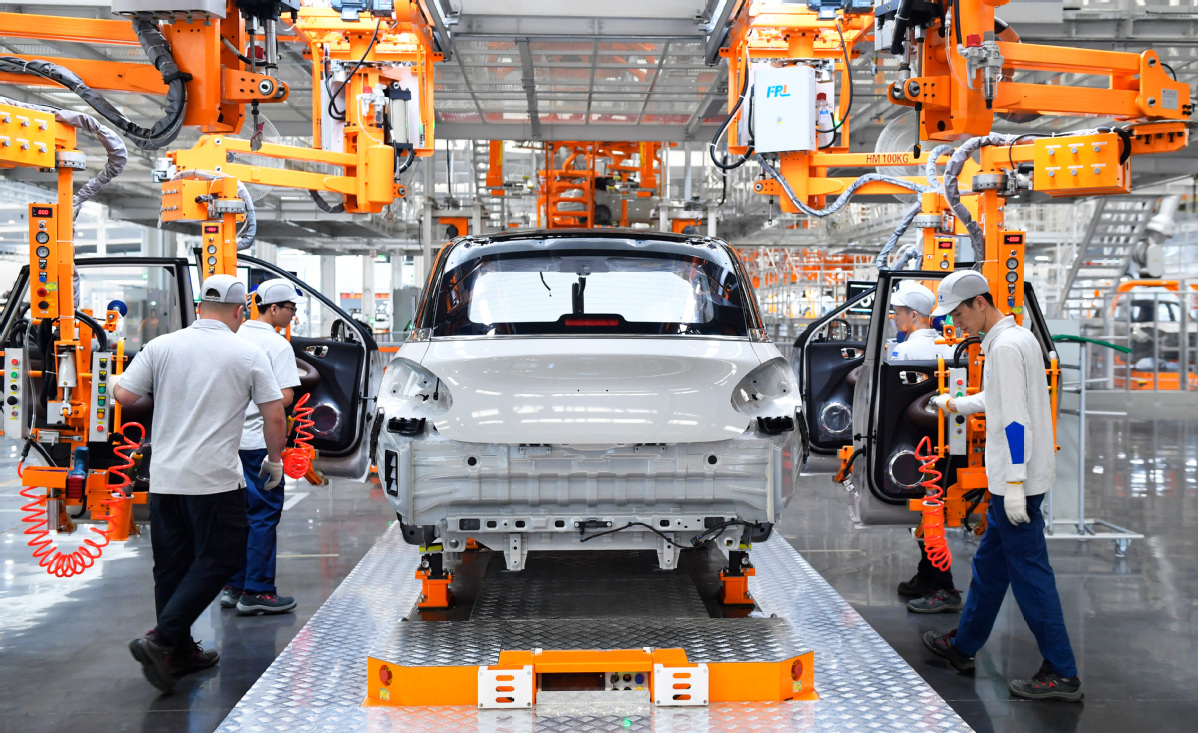SOEs set roadmap for rapid transformation
Big domestic firms capitalize on R&D, sales networks, services to forge new growth paths
By ZHONG NAN | China Daily | Updated: 2024-06-05 10:13

At the Shanghai Haitong International Automotive Terminal in Waigaoqiao area in late May, nearly 2,000 electric vehicles were being driven onto a car carrier.
These vehicles, produced by State-owned carmakers SAIC Motor and Chang'an Automobile Co, are scheduled for delivery to dealers and consumers in South America this month.
With China's EV industry developing advantages of scale after more than a decade of growth, State-owned automakers, such as China FAW Group, Dongfeng Motor Corp, Guangzhou Automobile Group and Beijing Automotive Group, are reinforcing their positions in the fuel-powered vehicle market while aggressively expanding into the EV sector.
To stay competitive, they are capitalizing on their strengths in research and development, sales networks and services to continuously forge new paths for growth.
Zhu Huarong, board chairman of Chongqing-based Chang'an Automobile, said the global automotive market will enter a new era dominated by EVs, pushing Chinese brands to go global.
Chang'an Automobile plans to launch around 60 products by 2030, entering more countries, building overseas sales networks in 20 global locations and investing 4 billion yuan ($552 million) in Thailand to build a global production base.
"Cars, initially just modes of transport, will transform into digital platforms, resembling connected and intelligent automotive robots," Zhu added.
While Guangzhou Automobile Group exports its products to more than 27 countries across the Middle East, the Americas, Africa and Southeast Asia, Beijing Automotive Group and SAIC Motor are collaborating with foreign partners or setting up factories and innovation centers overseas to broaden their global footprint.
Headquartered in Wuhan, Hubei province, Dongfeng Motor is also focusing on optimizing its business roadmap and has set a target of 3.2 million units in total sales and 300,000 units for exports this year.
Dongfeng Motor plans to launch 14 new models of self-branded passenger EVs and 10 commercial EVs from 2024 to 2025, as it continues to integrate research and development resources with investments exceeding 50 billion yuan over the next three years.
Automakers in China exported 1.83 million units of fuel and electric powered vehicles in the first four months of this year, up 33.4 percent from the same period of 2023, data from the China Association of Automobile Manufacturers show.
China's surging EV export volume has provided strong support for the growth in sales of domestic brands.
Chinese automakers launched 94 new models of new energy vehicles in 2023. This is 13 times the number introduced by joint venture brands in the same year, with domestic NEVs accounting for 80.6 percent.
Chen Shihua, deputy secretary-general of Beijing-based CAAM, said that the market share of domestic passenger cars has consistently risen, powered by the swift expansion of the EV sector and a significant surge in car exports, predominantly featuring domestic brands.
Moreover, domestic brands are undergoing rapid transformation, with leading domestic automakers moving toward electrification and smart technologies at a notably faster pace than foreign groups and their joint ventures, he said.
Echoing that sentiment, Yu De, managing director of SAIC Motor's international business unit, said that in addition to ordinary household users in many parts of the world, Chinese EVs are also favored by a large number of ride-hailing drivers in foreign countries, who generally perceive these vehicles as being of high quality and offering more value for money.













